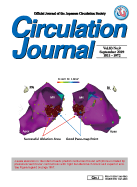
CIRCULATION JOURNAL
Scope & Guideline
Connecting Global Insights in Cardiology and Medicine.
Introduction
Aims and Scopes
- Clinical Cardiovascular Medicine:
The journal publishes studies that enhance clinical practice in cardiovascular medicine, including guidelines, treatment protocols, and outcomes related to various cardiovascular conditions. - Cardiovascular Imaging and Diagnostics:
Research on imaging techniques such as echocardiography, computed tomography, and magnetic resonance imaging is prevalent, aiming to improve diagnostic accuracy and patient management. - Heart Failure and Cardiomyopathy:
A significant focus is on heart failure management, including clinical trials, treatment strategies, and the underlying pathophysiology of cardiomyopathies. - Interventional Cardiology:
The journal covers advancements in interventional procedures, including coronary interventions, valve replacements, and the use of devices such as stents and pacemakers. - Preventive Cardiology and Risk Factors:
Studies addressing risk factors for cardiovascular disease, preventive strategies, and population health are key components, emphasizing the importance of lifestyle and medication adherence. - Emerging Technologies and Therapeutics:
The journal explores new therapeutic approaches, including pharmacotherapy, device innovations, and novel surgical techniques aimed at improving cardiovascular health.
Trending and Emerging
- Personalized and Precision Medicine:
There is an increasing focus on tailoring treatments based on individual patient characteristics, including genetic factors and specific comorbidities, enhancing treatment efficacy. - Integration of Artificial Intelligence and Machine Learning:
Studies incorporating AI and machine learning for risk prediction, diagnostics, and treatment recommendations are on the rise, indicating a shift towards data-driven approaches in cardiovascular care. - Cardio-Oncology:
The intersection of cardiology and oncology is becoming a significant area of research, focusing on the cardiovascular implications of cancer therapies and the management of patients with concurrent heart disease. - Telemedicine and Remote Monitoring:
With the rise of digital health, research on telemedicine applications for managing cardiovascular diseases and remote patient monitoring is increasingly relevant, especially post-COVID-19. - Holistic and Multidisciplinary Approaches to Heart Failure:
Emerging themes emphasize comprehensive care strategies for heart failure patients, integrating cardiology, geriatrics, and rehabilitation, reflecting the complexity of managing chronic conditions.
Declining or Waning
- Basic Science Research:
There has been a noticeable decrease in basic science studies focusing on cellular and molecular mechanisms of cardiovascular diseases, as the journal has shifted towards clinically oriented research. - Epidemiological Studies:
The volume of purely epidemiological studies concerning cardiovascular disease trends has diminished, possibly due to a more significant emphasis on interventional and clinical outcome studies. - Traditional Pharmacotherapy Studies:
Research focusing solely on established pharmacotherapies without exploring new combinations or emerging drugs has become less prominent as the field evolves towards more innovative solutions.
Similar Journals

Research in Cardiovascular Medicine
Fostering collaboration for breakthroughs in cardiovascular medicine.Research in Cardiovascular Medicine is a renowned open-access journal published by Wolters Kluwer Medknow Publications, dedicated to advancing knowledge in the swiftly evolving field of cardiovascular health. With an ISSN of 2251-9572 and E-ISSN of 2251-9580, this journal serves as a vital platform for researchers and professionals to share their findings, explore innovative treatments, and discuss current trends in cardiovascular care. Since transitioning to open access in 2013, it has democratized access to high-quality research, ensuring that vital information reaches healthcare practitioners and academia alike. The journal’s commitment to rigorous peer review and its emphasis on cutting-edge research contribute significantly to improving patient outcomes and addressing the global burden of cardiovascular diseases. By publishing original articles, review papers, and clinical studies, Research in Cardiovascular Medicine plays a crucial role in shaping the future of cardiovascular research and education, appealing to a wide audience of researchers, professionals, and students striving to make meaningful contributions to this critical field.
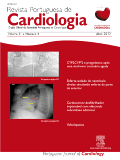
Revista Portuguesa de Cardiologia
Fostering collaboration and knowledge in the heart of cardiology.Revista Portuguesa de Cardiologia, published by Elsevier España SLU, stands as a pivotal resource in the realm of Cardiology and Cardiovascular Medicine. With its origins tracing back to 1970, this journal has cultivated a robust academic presence, achieving a 2023 Q3 ranking in its category, and currently holding a position of #220 out of 387 on the Scopus rankings, placing it within the 43rd percentile of its field. This open access journal, available since 2011, aims to disseminate high-quality research and insights relevant to contemporary cardiovascular issues. Its commitment to accessibility and knowledge exchange enhances its importance for clinicians, researchers, and students alike, fostering a more informed community in the fight against cardiovascular diseases. Operating from its base in Barcelona, Spain, the journal welcomes contributions that further the understanding and treatment of heart conditions, contributing significantly to the advancement of cardiovascular health.
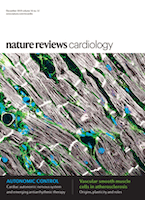
Nature Reviews Cardiology
Pioneering Excellence in Cardiac Research and Clinical PracticeNature Reviews Cardiology, published by NATURE PORTFOLIO, stands as a premier academic journal in the field of cardiology and cardiovascular medicine, boasting an impressive impact factor and a distinguished ranking of #1 out of 387 in Scopus. Since its inception in 2009, this exemplary journal has continuously delivered cutting-edge reviews and insights, supporting researchers, healthcare professionals, and students in navigating the complex landscape of cardiovascular health. With a commitment to providing open access and disseminating rigorous research, Nature Reviews Cardiology captures the forefront of innovation and scholarship, critical for facilitating advancements in cardiovascular science and clinical practice. Situated in the United Kingdom and with a vibrant global readership, this journal perpetuates academic excellence, ensuring accessibility to the latest findings that shape prevention, diagnosis, and treatment strategies in cardiology through to 2024 and beyond.
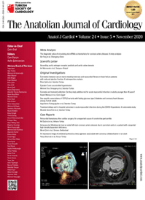
Anatolian Journal of Cardiology
Bridging Knowledge Gaps in Cardiology for a Healthier Tomorrow.The Anatolian Journal of Cardiology, published by KARE PUBL, stands as a vital resource in the field of Cardiology and Cardiovascular Medicine. With an ISSN of 2149-2263 and E-ISSN 2149-2271, this Open Access journal has been fostering the dissemination of critical research since 2001, ensuring that high-quality content is freely available to a global audience. Based in Turkey, the journal aims to bridge gaps in cardiological knowledge through rigorous peer-reviewed articles that span a wide range of topics, from innovative clinical practices to groundbreaking research findings. While its current ranking places it in the Q3 category of cardiology journals, the Anatolian Journal of Cardiology continues to strive towards enhancing its impact, currently holding a Scopus rank of 236 out of 387. Researchers, practitioners, and students alike will find this journal an essential platform for keeping abreast of the latest developments in cardiovascular health.

CANADIAN JOURNAL OF CARDIOLOGY
Elevating Standards in Cardiovascular ResearchCanadian Journal of Cardiology (ISSN: 0828-282X, E-ISSN: 1916-7075), published by Elsevier Science Inc, serves as a vital platform for disseminating high-quality research in the dynamic field of cardiology and cardiovascular medicine. Since its inception in 1985, this journal has established itself as a leader in the field, currently holding a prestigious Q1 ranking in Cardiology, indicating its significant impact and contribution to medical science. With a Scopus rank of #50 out of 387 in its category and placing in the 87th percentile, the journal showcases rigorous peer-reviewed articles that advance knowledge and practice in cardiology. Although the journal is not open access, it provides valuable insights and research findings that cater to clinicians, researchers, and students who are committed to improving cardiovascular health. As we approach the convergence of years to 2024, the Canadian Journal of Cardiology continues to strive for excellence, facilitating a discourse vital for both academic and clinical advancements in cardiology.
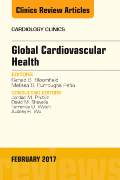
CARDIOLOGY CLINICS
Innovating cardiology with comprehensive reviews and expert analysis.CARDIOLOGY CLINICS is a prestigious journal published by W B SAUNDERS CO-ELSEVIER INC, offering insightful and comprehensive reviews in the field of cardiology and cardiovascular medicine since its inception in 1983. With its ISSN 0733-8651 and E-ISSN 1558-2264, the journal has established a significant impact factor within the academic community, holding a Q2 ranking in both Cardiology and Cardiovascular Medicine as well as in Medicine (miscellaneous) for 2023. Located in the heart of Philadelphia, USA, it serves as a vital resource for researchers, clinicians, and students seeking to deepen their understanding of cardiovascular diseases and advancements in treatment. Although it operates under a traditional subscription model, the journal remains committed to disseminating valuable knowledge that shapes current practices and informs future research directions. As it converges towards its 2024 issues, CARDIOLOGY CLINICS continues to play an influential role in enhancing the discourse on cardiovascular health worldwide, ensuring that its audience stays at the forefront of clinical and scientific developments.

Nepalese Heart Journal
Connecting Researchers and Clinicians for a Healthier FutureNepalese Heart Journal, published by the CARDIAC SOC NEPAL, serves as a premier platform for disseminating knowledge in the field of cardiology and cardiovascular health. With an ISSN of 2091-2978, this journal aims to bridge the gap between researchers, clinicians, and academicians by presenting high-quality, peer-reviewed articles that address clinical practices, innovative research, and emerging trends in heart disease management, especially within the context of Nepal and the surrounding region. Although it operates under a traditional publishing model, its commitment to excellence aids in reinforcing the scientific discourse in an area critical to public health. The journal is a valuable resource for professionals and students alike who are focused on advancing their understanding of cardiology and its implications for health policy and practice. Exploring the intersections of local challenges and global advancements in heart health, the Nepalese Heart Journal is poised to contribute meaningfully to the evolving landscape of cardiovascular research.

Journal fur Kardiologie
Connecting Professionals with Essential Cardiology Insights.The Journal fur Kardiologie, published by KRAUSE & PACHERNEGG GMBH, is a pivotal resource in the field of Cardiology and Cardiovascular Medicine. With an ISSN of 1024-0098 and an E-ISSN of 1680-936X, this journal has played a significant role in disseminating valuable research and clinical studies from 1998 until its coverage discontinuation in Scopus in 2017. Despite its Scopus rank being relatively low at #316/324 in its category, it continues to serve as a platform for emerging cardiology research. The journal’s scope encompasses various aspects of cardiovascular health, providing insights that are crucial for researchers, professionals, and students alike seeking to advance their knowledge and practice in cardiology. While the journal is not open access, its contributions to the field are essential for those looking to stay informed about the latest developments in cardiovascular medicine.

Minerva Cardiology and Angiology
Advancing cardiovascular knowledge for a healthier tomorrow.Minerva Cardiology and Angiology, published by EDIZIONI MINERVA MEDICA, is a prominent journal in the field of cardiology and cardiovascular medicine, with an ISSN of 2724-5683 and E-ISSN of 2724-5772. Established in 2021, this journal aims to foster the dissemination of cutting-edge research, clinical practice guidelines, and innovative methodologies relevant to cardiovascular health. As of 2023, it holds a commendable Q3 quartile rank in its category, reflecting its growing influence within the scientific community. The journal is indexed in Scopus, where it ranks #221 out of 387 in its field, placing it in the 43rd percentile overall. Although it currently does not offer Open Access options, articles published in Minerva Cardiology and Angiology contribute significantly to ongoing discussions and advancements in heart and vascular health. The journal serves as an invaluable resource for researchers, healthcare professionals, and students seeking to stay informed on the latest developments in cardiology.
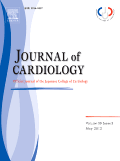
Journal of Cardiology
Pioneering research to transform cardiology practices.Journal of Cardiology, published by ELSEVIER, stands as a prominent resource in the field of cardiology and cardiovascular medicine. With a rich history since its inception in 1987, this peer-reviewed journal aims to disseminate cutting-edge research that enhances the understanding and treatment of cardiovascular diseases. Its 2023 ranking places it in the Q2 category within its discipline, reflecting its significance and impact, as evidenced by a Scopus rank of #123 out of 387 journals, positioning it in the 68th percentile of its field. The journal is headquartered in Japan, providing a unique perspective on cardiological advances relevant not only to the Asian continent but also globally. Though it does not currently offer open access, the Journal of Cardiology remains a vital institutional resource for researchers, clinicians, and students seeking to push the boundaries of cardiovascular science and improve patient outcomes.